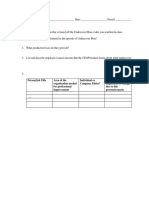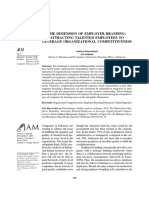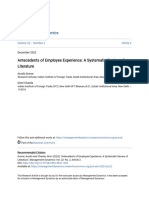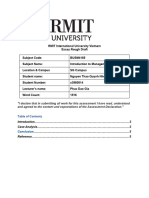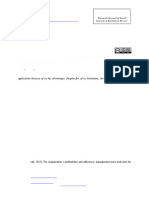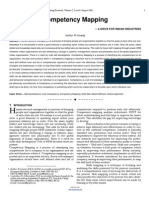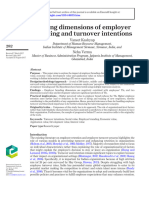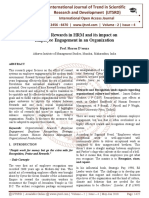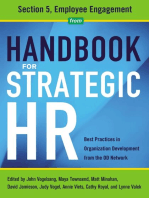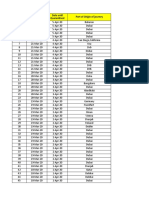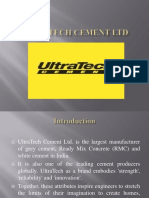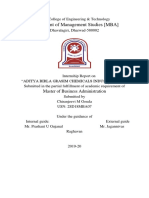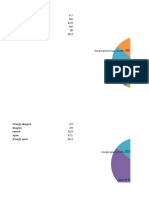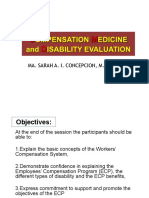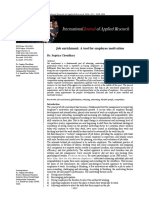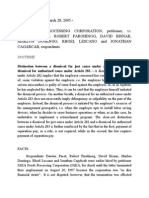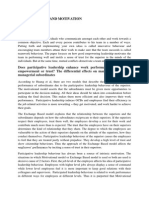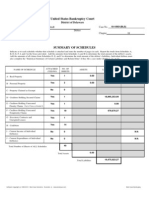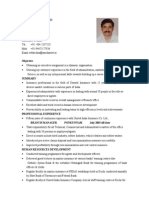0 ratings0% found this document useful (0 votes)
37 viewsAjith Article
Ajith Article
Uploaded by
Ajith naikA skill gap exists between the skills employers need and the skills employees possess. This skill gap is present in accounting education and harms both employers and employees. It reduces employee motivation, satisfaction and productivity. It also hinders firm performance, value and growth. The skill gap can be bridged by making accounting education more practice-oriented through industry interaction. Other suggestions include internships, collaborative learning, and continuing education. Bridging the skill gap is important for both employees and employers.
Copyright:
© All Rights Reserved
Available Formats
Download as PDF, TXT or read online from Scribd
Ajith Article
Ajith Article
Uploaded by
Ajith naik0 ratings0% found this document useful (0 votes)
37 views5 pagesA skill gap exists between the skills employers need and the skills employees possess. This skill gap is present in accounting education and harms both employers and employees. It reduces employee motivation, satisfaction and productivity. It also hinders firm performance, value and growth. The skill gap can be bridged by making accounting education more practice-oriented through industry interaction. Other suggestions include internships, collaborative learning, and continuing education. Bridging the skill gap is important for both employees and employers.
Original Description:
Management article
Copyright
© © All Rights Reserved
Available Formats
PDF, TXT or read online from Scribd
Share this document
Did you find this document useful?
Is this content inappropriate?
A skill gap exists between the skills employers need and the skills employees possess. This skill gap is present in accounting education and harms both employers and employees. It reduces employee motivation, satisfaction and productivity. It also hinders firm performance, value and growth. The skill gap can be bridged by making accounting education more practice-oriented through industry interaction. Other suggestions include internships, collaborative learning, and continuing education. Bridging the skill gap is important for both employees and employers.
Copyright:
© All Rights Reserved
Available Formats
Download as PDF, TXT or read online from Scribd
Download as pdf or txt
0 ratings0% found this document useful (0 votes)
37 views5 pagesAjith Article
Ajith Article
Uploaded by
Ajith naikA skill gap exists between the skills employers need and the skills employees possess. This skill gap is present in accounting education and harms both employers and employees. It reduces employee motivation, satisfaction and productivity. It also hinders firm performance, value and growth. The skill gap can be bridged by making accounting education more practice-oriented through industry interaction. Other suggestions include internships, collaborative learning, and continuing education. Bridging the skill gap is important for both employees and employers.
Copyright:
© All Rights Reserved
Available Formats
Download as PDF, TXT or read online from Scribd
Download as pdf or txt
You are on page 1of 5
www.icmai.
in November 2018 l The Management Accountant 1
COVER STORY
SKILL GAP IN ACCOUNTING
EDUCATION FOR
PROSPECTIVE MANAGERS
CMA (Dr.) Niranjan Mahendranath Shastri
Associate Professor
NMIMS, Indore Campus
Indore
Rachit Wadhwa Yashna Rampal
Scholar – PGDM Scholar – PGDM
NMIMS, Indore Campus NMIMS, Indore Campus
Indore Indore
66 The Management Accountant l November 2018 www.icmai.in
What is a Skill Gap? Figure 1 Indicating Technical Skill GapsSource: (Institute
“Employers expect graduates to be more prepared of Management Accountants, 2014)
than they actually are, resulting in an expectation-
performance gap. This gap refers to the difference between
the competencies desired by employers and the actual
competencies demonstrated by graduates.” (Brui, 2010)
“A skill gap is a gap between what employers want or need
their employees to be able to do, and what those employees
can actually do when they walk into work.”(Ryan, 2016)
“Skill Gap is the difference in the skills required on the job
and the actual skills possessed by the employees. Skill gap
presents an opportunity for the company and the employee
to identify the missing skills and try to gain them.”(Human
Resources Terms, n.d.) Figure 2 Indicating Non-Technical Skill GapsSource:
(Institute of Management Accountants, 2014)
For example, if an employee is recruited for the position
of management accountant and is expected to do financial
modelling using advanced excel functions, however he is
just able to use basic excel only, then there exists a skill gap.
Is there Skill Gap in Accounting Education?
“Over the past few decades, there has been an increasing
gap between accounting education and accounting
practice”(Siegel, 2010).It is vital for people who graduate
with accounting specialization to possess vivid technical
and non-technical skills so as to achieve success in career
(Klibi & Oussii, 2013), (Gabric, 2001), (Albrecht & Sack,
2000). The recent studies discussed here confirm the
criticism done by (Hawkes, Fowler, & Tan, 2003)that the Why there exists a skill gap?
various methods and techniques written in textbooks or According to(Jha, Chetna, Ponnam, & Ganguli,
taught to students have a limited use while practicing in 2013)“Various factors influence the students’ decisions in
real life. Thus there exists a wide skill gap in accounting exercising their option for the subject area of specialization
education which in turn leading to the presence of skill gap in the Post Graduate Business Management (PGBM)
in accounting professional which is likely to pull back their programs”. Due to such adding factor a void and a gap has
managerial prospects. been created between the skills acquired by an individual
and the skills needed by a recruiter. (Nasrollah & Martin,
(Institute of Management Accountants, 2014) found 2015).
that around the world, the problem of skill gap is being
widely faced by many enterprises, specially in the area of (Hakim, 2016) stated that manyrecruiters do not find
accounting and finance regardless of location, organization such accounting university programs which can provide
workforce size or job role. The gap between competencies graduates with required skill sets and such university
possessed by the accounting and finance professionals and graduates are not able to achieve expected standards
those needed by the enterprises is large. According to this of practitioners in thetechnological areas, interpersonal
study, the gap not only exists in technical but also in non- abilities, critical thinking, team building, communication
technical skills. Following two figures clearly indicate the skills, leadership, emotionalintelligence and ethics.
same: It appears that university accounting programs are
generallyframed togive a heavytheoretical accounting input
rather than focus on employability.
www.icmai.in November 2018 l The Management Accountant 67
COVER STORY
How Skill Gap Harms & Why Bridging Gap is Needed?
(Vroom, 1964) stated that if an employee thinks that, he
does not possess requisite skills to perform a job, it will
adversely affect his belief about his ability to perform the
job and in turn, he will not be motivated to do that job.
(Holland, 1997) described “the mismatch between the job
A skill gap is a gap between requirement and the employee abilities lead to discontent,
poor performance, low achievement, and job turnover”.
what employers need their
Inferior HR and Ethical practices may even lead to
employees to be able to do, corporate frauds (Mittal & Shastri, 2018).
and what those employees (Edwards, 1996) found that a deviation in the demands
can actually do. In this of the job and the competence of the employee to leads to
strain and tension. On the contrarydemands of the job and
study an attempt is made the competence of the employeeleads to job satisfaction.
to discuss the concept of “From the employer standpoint, job satisfaction is
skill gap and its existence important because it increases employee’s motivation and
productivity. If the employee is satisfied he/she will be more
in accounting education motivated to effectively complete a job. When individuals
with respect to prospective are satisfied with their jobs they will be motivated to
work harder and less likely to leave their jobs. Therefore,
mangers. This paper also job satisfaction contributes to motivation as well as the
employee’s future at the organization” (Brooks, 2007).
discusses whether any such
Such positive state of mind of the employee in which
gap actually lies between he goes the extra mile while discharging his ordinary
accounting professionals duties is called employee engagement which play a
vital role in enhancing firm value. (Shastri & Rajpurohit,
and employers and if so 2017).An engaged employee’s work-related state of mind
is characterised by dedication and vigour (Shastri &
what are the reasons behind Rajpurohit, Engaging the Millennials: Need of the Hour for
the same. The consequences Indian PSBS, 2018).
of skill gap for employers It is extremely important to bring coordination in HR
issues even for better synergy in Mergers &Acquisitions
and employee are also (Shastri & Shastri, 2014).
discussed in this paper Thus in brief it can be said that skill gap is not only
and a few suggestions are harmful for career prospects of the employee but also
create hindrances for firm performance, value and growth.
offered to bridge this gap. Hence there exists a clear cut need for bridging the skill gap.
How to Bridge the Skill Gap?
According to (Kalpan, 1984) the accounting education
for management students should be based on the basis of
interaction with real organizations and not on the basis of
models. He contributed to this field by innovating Activity
Based Accounting, Balanced Score Card and Economic
68 The Management Accountant l November 2018 www.icmai.in
Value Added which is now being widely studied and used can be done. In a group people of different nature, work
in the world of management accounting. capacities and intellects sit together to attain a common
goal of completing the task provided to them, thus
According to(Lange, Jackling, & Gut, 2006)the contents introducing them to a skill of team work and patience.
which are being taught to students in their under-graduate or
graduate courses need to be modified. The material cannot Software Based Learning: (Wood & Bailey, 1985) talks
be content based or bounded to theoretical techniques or about the real time experience which an individual gain
skills. To excel in this changeable environment, they need through simulation. According to (Foster, Gregor, Heaney,
to develop few extra generic skills and must showcase O’Neill, Richardson, & Wood, 2011) to understand the
certain technical skills. Generic skills in this reference is concept of electronic trading system, practical work is
to imbibe transferable characteristics to suit the business required. As it is difficult to do it in real time, thus simulation
in which these freshmen work, however they are not was used as a technique to achieve the experience and
constrained to communication, leadership, critical thinking execute it. Thus as he says, with advancing technology,
or interpersonal skills. Therefore it has been recommended one cannot stick to books and understand the Á concept.
that the accounting education needs to mirror a more Along with the traditional methods of journals and
prominent spotlight on the improvement of generic skills registers, the same should be taught on various softwares,
so that accounting profession can have more capable and computation and understanding for the same should take
proficient professionals (Albrecht & Sack, 2000). place in college so that the students are familiar with basic
working of accounting softwares and will make them more
With the quick and speedy change in business efficient during their work span in industries
environments and with steady and slow change in the
syllabus and regulation in colleges/ universities, there is a Exposure to Industries: (Sen, 2015) stated that more
formation of gap between the skills imbibed in you by the and more involvement of students with the industry makes
education system and the skills which are required by the a proper hit to reduce the gap. During their graduation or
industry recruiters. post graduation courses, students should be given exposure
to industries and companies, various visits and guest
In the field of accounting, new professions are coming lecture with industry professionals should be arranged,
up like consultancies which not only require the technical so that they know that what is expected out of them and
skills or the accounting skills gained by a student but also they can develop themselves on those lines and in that
other aspects or interpersonal skills are catered to. Thus direction. Students should be exposed to various corporate
to bridge this gap, education system needs to develop projects during their managerial course, which gives them
corresponding skills in students along with their general the feel of working as a professional and could figure out
technical knowledge imparted by them. The curriculum their problems and fill the voids by developing their skills
or methods used to impart these skills doesn’t have to be accordingly.
stagnant and can be counted under the practical aspects
which an individual will need in their professional life ahead. References
1. Aiken, M., Martin, J., & Paolillo, J. (1994). Requisite Skills of Business
The few styles and methods which can be considered by School Graduates: Perceptions of Senior Corporate Executives. Journal of
universities/ college can be: Education for Business , 69 (3), 159-162.
2. Albrecht, W. S., & Sack, R. J. (2000). Accounting Education:
Group Projects and Case study Approaches: According Charting the Course through a Perilous Future. American Accounting
to (Hamilton & Klebba, 2008) case study approach should Association, American Institute of Certified Public Accountants, Institute
be incorporated in the study of management education. of Management Accountants, Arthur Andersen, Deloitte & Touche, Ernst
This gives them a real time experience and a new learning. & Young, KPMG, PricewaterhouseCoopers.
He calls case analysis to be a perfect mixture of learning 3. Boatright, J. R. (1998). Teaching Finance Ethics. Teaching Business
in classrooms and real time experience. Case study also Ethics , 2 (1), 1-15.
develops the skill of critical thinking as an individual will 4. Brui, B. &. (2010). Expectation-Performance Gap in Accounting
use each and every learning to crack the case. To promote Education: An Exploratory Study. Accounting Education: An International
team work, case studies can also be done in groups. To Journal , 19 (1), 23-50.
cover various skill deficiencies like team work, good orator, 5. Edwards, J. (1996). An Examination of Competing Versions of The
negotiation and other interpersonal skills these activities Person-Environment Fit Approach to Stress. Academy of Management
www.icmai.in November 2018 l The Management Accountant 69
You might also like
- Individual Development Plan FormDocument1 pageIndividual Development Plan FormdocgilbertNo ratings yet
- HMSI Case AnalysisDocument14 pagesHMSI Case AnalysisAbhishek Srivastava50% (2)
- A Literature Review On Employee RetentioDocument7 pagesA Literature Review On Employee RetentioSumerNo ratings yet
- The HR Scorecard (Review and Analysis of Becker, Huselid and Ulrich's Book)From EverandThe HR Scorecard (Review and Analysis of Becker, Huselid and Ulrich's Book)Rating: 5 out of 5 stars5/5 (1)
- Working at Height With PicturesDocument32 pagesWorking at Height With PicturesBeste Ardıç Arslan100% (1)
- Bipartite Settlement 7Document24 pagesBipartite Settlement 7Nadeem MalekNo ratings yet
- Undercover Boss Worksheet With Rubric - Web DevelopmentDocument3 pagesUndercover Boss Worksheet With Rubric - Web DevelopmentTiffany100% (1)
- Skill Gap in Accounting Education For Prospective ManagersDocument8 pagesSkill Gap in Accounting Education For Prospective ManagersRachit WadhwaNo ratings yet
- 01 IRMM 13215 BadkookDocument9 pages01 IRMM 13215 Badkookassignment helpNo ratings yet
- Role of Human Resource Management in The Productivity of Private EmployeesDocument5 pagesRole of Human Resource Management in The Productivity of Private EmployeesEditor IJTSRDNo ratings yet
- Inbound 4733150873477130587Document7 pagesInbound 4733150873477130587Roselle Luzano GalugaNo ratings yet
- Shakira-An Chee Yong - JPSP - ALDocument9 pagesShakira-An Chee Yong - JPSP - ALelvangokdemir19No ratings yet
- Employee Competencies Acting As An Intermediary On Measuring Organizational Productivity: A Review PerspectiveDocument8 pagesEmployee Competencies Acting As An Intermediary On Measuring Organizational Productivity: A Review PerspectiveTJPRC PublicationsNo ratings yet
- 61f9615c26e677 71802662Document4 pages61f9615c26e677 71802662azeez oluwaseyiNo ratings yet
- Impact of Different Training and Development ProgrDocument7 pagesImpact of Different Training and Development ProgrKyaw Ko Ko ThuNo ratings yet
- HR Trends in Service Sector A Theoretical Frame WorkDocument2 pagesHR Trends in Service Sector A Theoretical Frame WorkAbirami ThevarNo ratings yet
- CIRD MHRRJ 21 0714+finalDocument5 pagesCIRD MHRRJ 21 0714+finalwizichicomputerNo ratings yet
- Job Rotation and Work MotivationDocument9 pagesJob Rotation and Work MotivationdentyhakimiNo ratings yet
- Paper 2 Grupo 2Document9 pagesPaper 2 Grupo 2jaimeortega02No ratings yet
- A Study of Empowerment and Engagement of ITESBPO Professionals in Delhi & NCRDocument9 pagesA Study of Empowerment and Engagement of ITESBPO Professionals in Delhi & NCRfayazalamaligNo ratings yet
- 160-Article Text-818-3-10-20220825Document13 pages160-Article Text-818-3-10-20220825Định TôNo ratings yet
- 1-Antecedents of Employee Experience - A Systematic Review of LiteratureDocument12 pages1-Antecedents of Employee Experience - A Systematic Review of LiteratureShireesha SanguNo ratings yet
- Training_and_Development_Programs_in_PubDocument16 pagesTraining_and_Development_Programs_in_PubpuremahafuzulNo ratings yet
- 1 (5) The Role of Empowerment in Improving Internal Process, Customer Satisfaction, Learning and GrowthDocument8 pages1 (5) The Role of Empowerment in Improving Internal Process, Customer Satisfaction, Learning and GrowthchuchungcangNo ratings yet
- HRM Portfolio Lory 1Document13 pagesHRM Portfolio Lory 1Ed LoboNo ratings yet
- The Mediating Effect of Job Satisfaction To Predict The Role of Talent Management Strategy in Improving Employee RetentionDocument7 pagesThe Mediating Effect of Job Satisfaction To Predict The Role of Talent Management Strategy in Improving Employee RetentionAnonymous izrFWiQ100% (2)
- Effect of Talent Management On Employee Performance of Selected Commercial Banks in Abuja NigeriaDocument20 pagesEffect of Talent Management On Employee Performance of Selected Commercial Banks in Abuja NigeriaIsmail SuleimanNo ratings yet
- How To Make Employees Stay in A Company: Puteri Andika SariDocument10 pagesHow To Make Employees Stay in A Company: Puteri Andika SariMarj LegaspiNo ratings yet
- Arabian JournalDocument7 pagesArabian JournalDoyel ChakiNo ratings yet
- Scopus Indexed Journal's ListDocument8 pagesScopus Indexed Journal's ListSai ReddyNo ratings yet
- 09 Ijmres 10022020Document11 pages09 Ijmres 10022020International Journal of Management Research and Emerging SciencesNo ratings yet
- 997 ArticleText 1801 1 10 20210130Document14 pages997 ArticleText 1801 1 10 20210130Yashas N YNo ratings yet
- Jurnal Utama Thesis Utama EndangDocument19 pagesJurnal Utama Thesis Utama Endangensebrina01No ratings yet
- The Influence of Job Satisfaction Work MotivationDocument10 pagesThe Influence of Job Satisfaction Work MotivationMrandMrs GligorovNo ratings yet
- HRM LR - semiFINAL (Edited)Document14 pagesHRM LR - semiFINAL (Edited)Yashra NaveedNo ratings yet
- 169-Article Text-852-1-10-20220411Document12 pages169-Article Text-852-1-10-20220411muhammad haris noviantoNo ratings yet
- 20.epra Journals-3730Document7 pages20.epra Journals-3730s1baeng111804867No ratings yet
- An Inclusive Analytical Study of Employability Skill Gaps and their Assessment Across IndiaDocument9 pagesAn Inclusive Analytical Study of Employability Skill Gaps and their Assessment Across IndiaInternational Journal of Innovative Science and Research TechnologyNo ratings yet
- Impact of Different Training and Development Programs On Employee Performance in Bangladesh PerspectiveDocument8 pagesImpact of Different Training and Development Programs On Employee Performance in Bangladesh PerspectiveMizanur Rahman EmonNo ratings yet
- 1 HRMP OL Cap Performance p69 Mo Hinh Hooi2020 XemDocument24 pages1 HRMP OL Cap Performance p69 Mo Hinh Hooi2020 XemPhạm NhungNo ratings yet
- EMPLOYEE RESOURCING INDIVIDUAL ASSIGNMENTDocument8 pagesEMPLOYEE RESOURCING INDIVIDUAL ASSIGNMENTmutumburanzoukudzaiNo ratings yet
- JETIR2110160Document13 pagesJETIR2110160komema3050No ratings yet
- Javariya Mufarrakh - 22110107 - MSBADocument1 pageJavariya Mufarrakh - 22110107 - MSBADr. Danish MehmoodNo ratings yet
- ITMDocument10 pagesITMQuynh NhuNo ratings yet
- Evaluating The Moderating Role of PersonOrganization Fit On The Relationship Between Employer Branding and Intention To StayDocument6 pagesEvaluating The Moderating Role of PersonOrganization Fit On The Relationship Between Employer Branding and Intention To StayInternational Journal of Innovative Science and Research TechnologyNo ratings yet
- A Study On Assessment of Skill Gap To Enhance Workforce PerformanceDocument17 pagesA Study On Assessment of Skill Gap To Enhance Workforce PerformanceMahmoud GhumaidNo ratings yet
- Chapter 3Document21 pagesChapter 3gdjwoqy bsysvwvNo ratings yet
- 522-Article Text-3843-3-10-20221123Document13 pages522-Article Text-3843-3-10-20221123Nguyen An DiNo ratings yet
- Relative Value of Hard Skills and Soft SDocument5 pagesRelative Value of Hard Skills and Soft Sankit thapliyalNo ratings yet
- HRMP and ToiDocument29 pagesHRMP and ToiMuhammad Tanzeel Qaisar DogarNo ratings yet
- Researchpaper Competency MappingDocument7 pagesResearchpaper Competency MappingGhansham PanwarNo ratings yet
- The Influence of Talent Management and Work Life Balance On Employee Performance With Employee Engagement As Intervening MediaDocument6 pagesThe Influence of Talent Management and Work Life Balance On Employee Performance With Employee Engagement As Intervening MediaInternational Journal of Innovative Science and Research TechnologyNo ratings yet
- Employability Skills A Conceptual Framew PDFDocument8 pagesEmployability Skills A Conceptual Framew PDFDarilyn AndayaNo ratings yet
- Strategic Management of Human Resources AnalysingDocument8 pagesStrategic Management of Human Resources Analysingshafingamer15No ratings yet
- The Impact of Talent Management On Employee EngageDocument12 pagesThe Impact of Talent Management On Employee Engagemaisha tahsinNo ratings yet
- Linking Dimensions of EmployerDocument15 pagesLinking Dimensions of Employerensebrina01No ratings yet
- The Employee Performance AssessmentDocument10 pagesThe Employee Performance AssessmentMulia PutriNo ratings yet
- International Journal of Management (Ijm) : ©iaemeDocument8 pagesInternational Journal of Management (Ijm) : ©iaemeIAEME PublicationNo ratings yet
- JETIRA006052Document7 pagesJETIRA006052Bhavleen KaurNo ratings yet
- Employee Rewards in HRM and Its Impact On Employee Engagement in An OrganizationDocument8 pagesEmployee Rewards in HRM and Its Impact On Employee Engagement in An OrganizationEditor IJTSRDNo ratings yet
- EI and Job SatisfactionDocument18 pagesEI and Job SatisfactionNivedita JhaNo ratings yet
- HR Practices in IT Companies: Research PapersDocument6 pagesHR Practices in IT Companies: Research Papers072Sheeba JavajalaNo ratings yet
- Job Design and Employee Involvement On Smes Performance The Mediating Role of Employee MotivationDocument14 pagesJob Design and Employee Involvement On Smes Performance The Mediating Role of Employee MotivationplatonjoiecyraNo ratings yet
- 01fm18mba016 PDFDocument59 pages01fm18mba016 PDFAjith naikNo ratings yet
- A Study On "Strategic Management Tool For Ngo Sector"Document60 pagesA Study On "Strategic Management Tool For Ngo Sector"Ajith naikNo ratings yet
- Ajith ResumeDocument2 pagesAjith ResumeAjith naikNo ratings yet
- Uttara KannadaDocument36 pagesUttara KannadaAjith naikNo ratings yet
- GENPACT Job DescriptionDocument2 pagesGENPACT Job DescriptionAjith naikNo ratings yet
- HRMDocument26 pagesHRMAjith naikNo ratings yet
- Ajith Naik: Present Address Permanent AddressDocument2 pagesAjith Naik: Present Address Permanent AddressAjith naikNo ratings yet
- Chiru Internship Cover PageDocument3 pagesChiru Internship Cover PageAjith naikNo ratings yet
- Ajith Naik: Present Address Permanent AddressDocument2 pagesAjith Naik: Present Address Permanent AddressAjith naikNo ratings yet
- SDME Society's SDM College of Engineering & Technology Department of Management StudiesDocument2 pagesSDME Society's SDM College of Engineering & Technology Department of Management StudiesAjith naikNo ratings yet
- APRAMEYADocument15 pagesAPRAMEYAAjith naikNo ratings yet
- Book 11111Document6 pagesBook 11111Ajith naikNo ratings yet
- Goods Inwards Inspection: Revision: ADocument3 pagesGoods Inwards Inspection: Revision: AAjith naikNo ratings yet
- Business Plan: OwnersDocument11 pagesBusiness Plan: OwnersAjith naikNo ratings yet
- Single PopulationDocument25 pagesSingle PopulationJai GuptaNo ratings yet
- Selfie 1x01 - Pilot PDFDocument37 pagesSelfie 1x01 - Pilot PDFSagui CohenNo ratings yet
- Tank Builders ScaffoldDocument40 pagesTank Builders ScaffoldEhab SaadNo ratings yet
- Compensation MedicineDocument46 pagesCompensation Medicinemefav7778520100% (1)
- Personal Experience of Industrial VisitDocument1 pagePersonal Experience of Industrial VisitSayan ChatterjeeNo ratings yet
- DB2 Label-Based Access ControlDocument34 pagesDB2 Label-Based Access ControlAlexandre De AlmeidaNo ratings yet
- Employee SatisfactionDocument8 pagesEmployee SatisfactionSai Sudha100% (1)
- Assessment Task 2 Organisation Development Plan TemplateDocument4 pagesAssessment Task 2 Organisation Development Plan TemplateManpreetNo ratings yet
- Arvind SharmaDocument4 pagesArvind Sharmashannbaby22No ratings yet
- United States Court of Appeals, Second Circuit.: No. 565, Docket 90-7535Document7 pagesUnited States Court of Appeals, Second Circuit.: No. 565, Docket 90-7535Scribd Government DocsNo ratings yet
- Current Trends in HR ManagementDocument18 pagesCurrent Trends in HR ManagementPROFESSOR DON DALIDNo ratings yet
- Passive Agresive at WorkDocument2 pagesPassive Agresive at WorkConstantin BulichiNo ratings yet
- HR Director Recruiting Manager in Nashville TN Resume Lisa Hambrick-JohnsonDocument3 pagesHR Director Recruiting Manager in Nashville TN Resume Lisa Hambrick-JohnsonLisaHambrickJohnsonNo ratings yet
- Introduction of CompensationDocument13 pagesIntroduction of CompensationYenkee Adarsh AroraNo ratings yet
- DR SupriyaDocument5 pagesDR SupriyangurahwNo ratings yet
- ExeQserve Performance Management System ImplementationDocument9 pagesExeQserve Performance Management System ImplementationEdwin EbreoNo ratings yet
- The City SchoolDocument8 pagesThe City SchoolMaria MasoodNo ratings yet
- (Art 279) Jaka Food Processing Corp V PacotDocument3 pages(Art 279) Jaka Food Processing Corp V PacotRoy DaguioNo ratings yet
- Lecture Notes On OrganizingDocument10 pagesLecture Notes On OrganizingMikaela LaoNo ratings yet
- IncomeTax Banggawan Ch11Document9 pagesIncomeTax Banggawan Ch11Noreen Ledda33% (9)
- Class 12Document14 pagesClass 12Sarath AjithNo ratings yet
- Annotated Bibliography MotivationDocument5 pagesAnnotated Bibliography MotivationGayatri VenugopalNo ratings yet
- United States Bankruptcy Court: District of DelawareDocument42 pagesUnited States Bankruptcy Court: District of DelawareChapter 11 DocketsNo ratings yet
- Sebastian Chacko: ObjectiveDocument3 pagesSebastian Chacko: ObjectivefenomenonNo ratings yet
- Organization ChartDocument14 pagesOrganization ChartUmarNo ratings yet
- List of MOM Accredited Courses - 06jan2014Document5 pagesList of MOM Accredited Courses - 06jan2014bobjuan84No ratings yet






